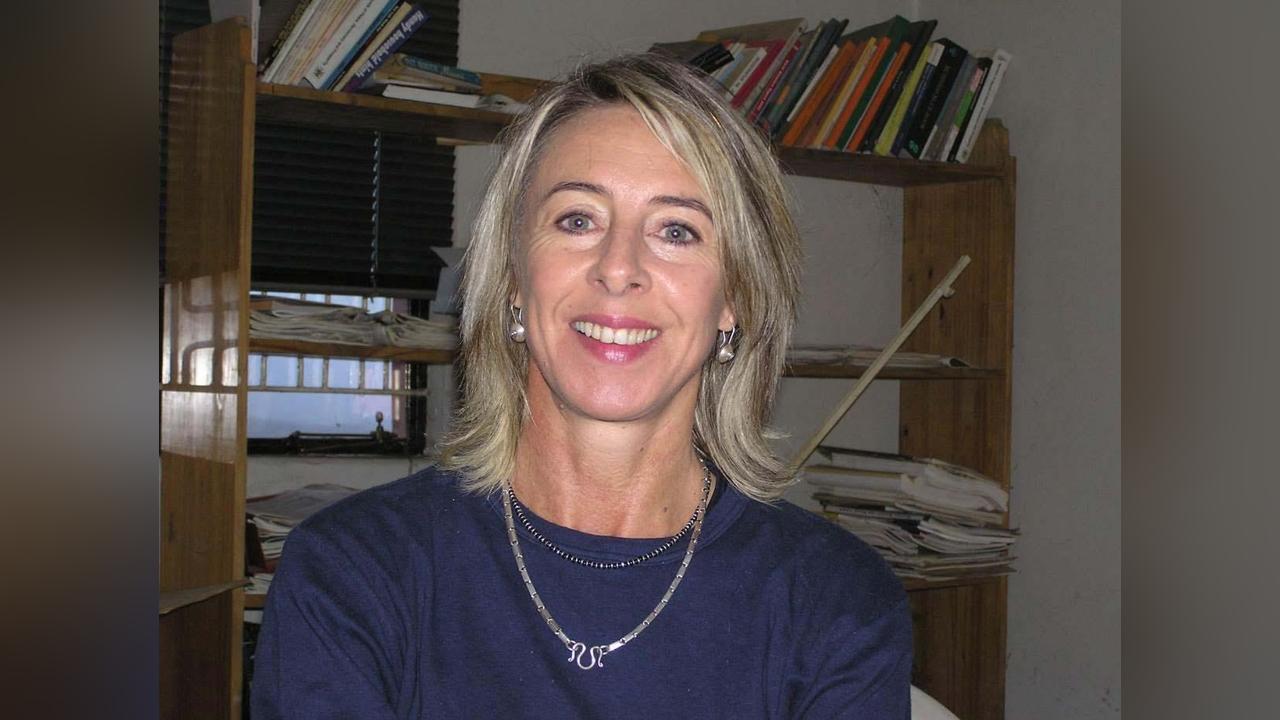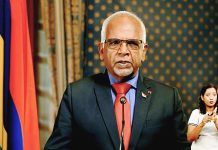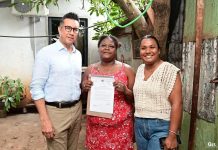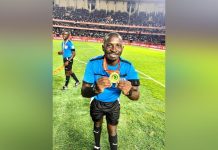Africa-Press – Mauritius. Gwen Lister, the well known anti-apartheid veteran journalist of Namibia, has published an intriguing autobiography entitled: Comrade Editor: On Life, Journalism and the birth of Namibia.
The book which was released in 2021, is a multipronged piece of work, chronicling the life of the journalist and activist and her critical views on the struggle against apartheid and colonialism in Namibia. It also carries some rare photographs from the war of liberation of Namibia.
In reviewing Gwen Lister’s voluminous autobiography, Comrade Editor, it is easy for anyone to repeat and restate the well-known fact that Gwen Lister a brave woman and an anti oppression journalist who has spent most of her life in Namibia.
Therefore it may be useful to read her book in search of how the critical stages in the life of the mother of two helped her enact the ideas and values that she lives by. As seen through this book, Gwen Lister’s life itself is a compact compendium and journalists, media scholars, political scientists, historians, artists and others will find something to take home.
Lister writes much early in her memoir that when she was a much younger girl in South Africa where she was born to English-speaking parents, she initially disliked confrontation as she found it upsetting. She adds that this is very ironic because all her life, through journalism, she chose to confront abuse of power and injustice. Her whole life took that least expected turn.
She also admits to initially having been a very insecure child as shown by her childhood habit of nail biting. And yet she soon embarked on a life spent standing up against all forms of injustice. That contradiction of vacillating between a traditional woman to a hot radical feminist and activist was to show throughout her life.
The English speaking girl from the Eastern Cape starts to wake up to issues of identity more like Pecola in Toni Morrison’s novel, The Bluest Eye. Gwen Lister finds that she is a white South African and therefore privileged. But she does not take that route.
This is a fact that runs through this book. Her English people are in constant conflict with the Afrikaners. She writes delicately about it: “Like many English speakers back then, my parents were ‘decent’ people, but also conflicted about South Africa and its future.
They weren’t keen on Afrikaner domination and were critical of apartheid, but could not bring themselves to disparage it too severely or too openly for fear of being regarded disloyal.’
By 1960, Lister had heard her parents talk in hushed tones about the terrible killings of black people in Sharpeville. As she tries to come to terms with that, she comes to discover Martin Luther King Junior’s “I have a dream” speech which affects her deeply to a point of desperation. She also throws herself into books and more books.
She finds her way into Leonard Cohen’s music until all she wants to become is “a sultry jazz singer in a smoky club.” In the 1970’s, she comes across more naked racism which she abhors immediately. At one point, she tells a fellow journalist that she was trying not to think of herself as white! She starts to hate her skin because of the crimes committed under it.
When applying for identity documents, she starts to tick the ‘other’ box, instead of ‘white.’ She suffers from an identity crisis. The earliest high point in this book is when Lister writes: “I’d felt no affinity with most whites during much of my life, experienced no cultural pull and despite the shared privileges associated with this skin colour.
I found it difficult to identify with them.” Even if many white people have admitted to having gone through this, it is something that you rarely come across in books by white people from the Southern African sub-region.
Gwen Lister comes face-to-face with apartheid even at a larger scale. She watches an elderly black woman having to step off a pavement to make way for a group of arrogant white teens. She discovers that while her parents are not adherents of apartheid, but by virtue of their privilege, they were part of the unjust system. She finds them disgusting in that regard. So the older she gets, the more she becomes conflicted.
She also finds that her family is also very traditional and bigoted. When in her matric year, she tells her parents that she wants to go to the University of Cape Town but her father objects and flatly, says, “Women don’t go to university. They get married and have kids. And then what use is a degree and all that money wasted?”
Eventually, and after cajoling her parents, she gets to UCT and graduates with a degree in Ethics, Political Philosophy and History. At university she cultivates waist length hair, wears a kaftan and is usually barefoot, running amongst the dreaded lefties. She has crossed the line.
By the time she is through with her first degree she realises that there is a lot of fighting for liberation in the Southern African sub-region countries and that her white people are at the receiving end. She actually mulls joining the liberation struggle on the black side regardless of her colour. Her life is in constant turmoil and she is not your typical white child.
Her friend, Shirley actually joins Umkhonto we Sizwe, the military arm of the ANC. But Lister says she was not committed to fight in the literal sense. She preferred what she calls “the peace movement” to actual violence, even when she understood why many others felt the need for violence.
This is a watershed moment for Gwen. Is she terrified to directly confront her people? Or, would journalism provide the type of activism that she craved? In a sense, she is looking for a place that allows her to express her ideas as a way of directing the struggle against apartheid.
She looks further than South Africa and finds Namibia, and then called South West Africa, quite appealing. That her father has been long transferred to a post in a bank in Namibia helps matters. She finds herself as a political reporter at the Windhoek Advertiser but after a very difficult and dramatic interview amongst bigots and stubborn men.
In that interview, the self-styled editor, a Mr Johannes Smittie, often called Smithy, gives Lister a torrid time. He starts off by telling Lister that women get married and that their husbands do not like them working. Lister immediately develops one key philosophy in her life: “I wouldn’t allow a relationship or marriage to deter me from my chosen career.” This becomes crucial in her life.
Eventually her tumultuous time at the Windhoek Advertiser begins. First she breaks up with her lover in South Africa to take up this post in South West Africa. Her words are very instructive and critical to what she does with her life from this point on: “It was especially difficult to say goodbye to Tommy.
I’d finally acknowledged that our relationship had run its course. Committed to teaching, film making and art, Tommy’s own brand of activism and community involvement kept him busy and our relationship came second…I wanted more than he was prepared to give.”
Lister’s job at the Advertiser comes when she had never had formal training in journalism. This broadens her inherent but controversial idea that journalists are born and not trained. She admires her boss for rising to the level of editor without even having any formal training in journalism:
“At times I felt a grudging admiration for a man who, despite these beginnings and a lack of formal education, had become editor of the country’s foremost English language newspaper. Smittie recalled how, as a youngster in the big city, he had frequently walked past the newspaper offices along Stuebel Street and peered through the window, resolving that he would become a reporter one day. It made me realize how important it is to have a childhood dream.”
Editor Smittie often throws Lister into the deep end and chases her from pillar to post. She is like a rag in the wind. His blows strengthen her. In no time she learns on the job about making news. Meanwhile, the so-called Border War intensifies as the South African Defence Forces continue to hold on to South West Africa despite the fact that in 1963, the UN Security Council had declared South Africa’s continued occupation of that territory illegal.
In 1973, the same Council declares that SWAPO is the ‘sole authentic’ representative of Namibia’s people. For a fact, in August 1966, the first shots were fired when the SADF attacked SWAPO fighters at Omugulugwombashe in Northen Namibia, killing and capturing others. Soon afterwards, Ya Toivo, one of the heroes of this struggle and about 63 others, were arrested and got incarcerated at South Africa’s infamous Robben island prison.
Following the withdrawal of the Portuguese from Angola in 1975, the SADF also becomes increasingly active in Angola. They also support the pro-western UNITA fighters led by Savimbi against the MPLA and its armed wing, the FAPLA, which is backed by the Soviet Union and Cuba. This is the time when Lister takes up her post as political reporter at the Advertiser. Naturally Lister tends to side with the liberation movement, regardless of her colour.
She often finds herself in the famous Katutura Township, gathering news in such a political hotbed. She gets privileged information from SWAPO and its armed wing and publishes it. She rubs shoulders with key SWAPO members at home; the likes of Nathaniel Maxuilili and Hendrick Witbooi.
Eventually the sponsors of the paper are enraged and the newspaper is sold to the next bidder, leaving Lister and colleagues out of employment. They are out in the open! Another bitter lesson about journalism and the slant.
Eventually, Lister and friends gang up to form another newspaper that became known as The Observer. Another lesson about the determination of journalists. The Observer’s first issue appears on 4 May 1978, the day on which the SADF attacks SWAPO’s Cassinga and Chatequera camps in Southern Angola, killing an estimated 600 people and capturing many others.
It was a turning point in the war, resulting in SWAPO gaining a lot of humanitarian and financial support from across the world. The Observer also gets similar support as it positions itself as the voice of the downtrodden. It is also the sole voice that could get into SWAPO psyche and broadcast it to the world.
Lister is overwhelmed with work and she starts to multitask, working beyond being a news reporter. It is while at The Observer that Lister meets the leader of Swapo, Sam Nujoma, during the April 1983 UN Conference in Paris. Her description of Nujoma on page 112 is moving. But on returning home, she is arrested at South Africa’s Jan Smuts airport. She is charged with possession of banned materials, most of it SWAPO literature.
You may actually think that by gaining access to SWAPO and its key leaders, Lister had become a blind accomplice. Far from it! When Nujoma offers her money in March 1985 in Zambia, to form a new paper, after the troubles at The Observer, she flatly refuses and returns it to him. Lister writes: “I was nervous. I needed SWAPO’s support to source funds for my newspaper, but did not want to compromise my independence.” Another lesson in journalism: principle is higher than money.
Lister is not a praise singer. On the many occasions that she meets Nujoma before Namibia’s independence, she is overwhelmed by his unique presence and camaraderie but she is able, even as early as then, to pick out some of what she thinks were apparent leadership weaknesses of the leader. She reads him like a book! But she also admits that he could see who she was! Such passages present the most illuminating moments in this very elaborately written book.
It is very clear that the leading minds in SWAPO see Lister as their window to the world. She is able to bring them at ease despite being a white woman in a black crowd. Even those at Robben Island, including Nelson Mandela, make her know how much they appreciate her objective writings.
She gravitates towards criticising her ideological friends when she thinks they have gone wrong, something that is often missing from many journalistic works from the Southern Africa sub-region. Lister’s insights into the ideas and the indefatigable personality of hero Ya Toivo, is also a key matter in this book. I have a strong feeling that she will do a book specifically on him, soon.
Gwen Lister was born in East London. She attained a Bachelor of Arts Degree at the University of Cape Town. In 1976 she commenced work as a journalist at the Windhoek Advertiser in Namibia. She soon became deeply engrossed in political coverage in Namibia, adopting a critical stance towards the South African occupation of Namibia.
In 1978 she and the former Editor of the Advertiser, Hannes Smith, started the Windhoek Observer. She was also a correspondent for the Africa Service of the British Broadcasting Corporation (BBC)
In 1985 Lister started an independent newspaper, The Namibian. The newspaper was the only one of its kind in Namibia to explore the ongoing atrocities and human rights violations of Namibians at the hands of South African security forces.
She is a recipient of a number of international courage in journalism awards from, among others, the International Women’s Media Foundation (IWMF) and the Committee to Protect Journalists (CPJ). She was also named a World Press Freedom Hero by the International Press Institute (IPI) in 2000. Lister has two children and lives in Namibia.
For More News And Analysis About Mauritius Follow Africa-Press







